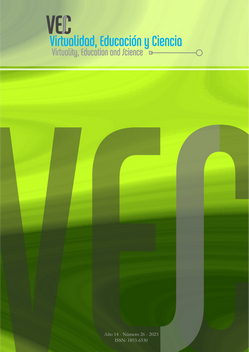Teaching music to children in times of health emergency. A didactic and techno-pedagogical analysis based on experience
DOI:
https://doi.org/10.60020/1853-6530.v14.n26.43749Keywords:
early childhood education; emergency remote teaching; music education; hypermedia didactic materialsAbstract
Educating children during 2020 represented complex challenges for all the actors involved in this process. For the teaching teams, the issue of how to sustain the pedagogical link mediated by technologies with children from 3 to 5 years old was central. This paper shows the experience of technopedagogical design for teaching music to children between 3 and 5 years old during the context of remote emergency education (Hodges et al., 2020). We analyse the characteristics acquired by the proposal and identify two levels of reflection interrelated: the didactic analysis of the musical content at the early childhood education and the technopedagogical reflection on the design of an online environment in which establish and sustain links, promote interaction, mediate and scaffold the musical learning processes.
References
Casablancas, S., Pose, M. y Raynaudo, G. (2021). Evidencias acerca del uso, comprensión y aprendizaje con tecnología digital en la primera infancia. En Crescenzi-Lanna, L. y Grané, M. (coord.). Infancia y pantallas. (pp. 29-38). Octaedro. https://doi.org/10.36006/16283
Galván Dueñas, F.; Huayta Franco, Y. y Bustamante Romaní, G. (2022). La educación preescolar a distancia durante la pandemia COVID-19.
IGOBERNANZA, 5(19), 119–136. https://doi.org/10.47865/igob.vol5.n19.2022.208
Gayatri, M. (2020). The implementation of early childhood education in the time of covid-19 pandemic: a systematic review. Humanities & Social Sciences Reviews, 8(6), 46-54. https://doi.org/10.18510/hssr.2020.866
Greenhow, C.; Lewin, C. y Staudt Willet, K. (2021) The educational response to Covid-19 across two countries: a critical examination of initial digital pedagogy adoption. Technology, Pedagogy and Education, 30(1), 7-25. https://doi.org/10.1080/1475939X.2020.1866654
Gonzalez Tardón, C. (2010) Inmersión en mundos simulados. Definición, factores que lo provocan y un posible modelo de inmersión desde una perspectiva psicológica. Investigaciones Fenomenológicas, vol. monográfico 2: Cuerpo y alteridad.
Hargreaves, D. (1998) Música y desarrollo psicológico. Graó.
Hodges, C.; Moore, S.; Lockee, B.; Trust, T. y Bond, A. (2020). The Difference Between Emergency Remote Teaching and Online Learning. https://er.educause.edu/articles/2020/3/the-difference-between-emergency-remote-teaching-and-online-learning
Kruszewska, A.; Nazaruk, S. y Szewczyk, K. (2022) Polish teachers of early education in the face of distance learning during the COVID-19 pandemic – the difficulties experienced and suggestions for the future. Education 3-13. International Journal of Primary, Elementary and Early Years Education, 50(3), 304-315, https://doi.org/10.1080/1475939X.2020.1866654
Langhi, M. (2022). ¡Qué la música siga sonando en casa! Experiencia argentina de diseño de materiales didácticos hipermediales para educación infantil durante la pandemia del covid-19. En Román-Graván, P., Barragán-Sánchez, R., Gutiérrez-Castillo, J.J., y Palacios-Rodríguez, A. (2022). Dibujando espacios de futuro inclusivos con TIC en Educación Infantil. III Congreso Internacional de Innovación y Tecnología Educativa en Educación Infantil. Sevilla, España. Pp. 102-106. Disponible en: http://www.pent.org.ar/institucional/publicaciones/que-musica-siga-sonando-casa-experiencia-argentina-diseno-materiales-did
Lau, E. y Lee, K. (2021) Parents’ Views on Young Children’s Distance Learning and Screen Time During COVID-19 Class Suspension in Hong
Kong. Early Education and Development, 32(6), 863-880. https://doi.org/10.1080/10409289.2020.1843925
Maggio, M. (2012). Enriquecer la enseñanza. Los ambientes con alta disposición tecnológica como oportunidad. Paidós.
Marina, J. y Marina, E. (2013). El aprendizaje de la creatividad. Ariel.
Redondo, P. (2020) Educar a la primera infancia en tiempos de excepción. En Dussel, I; Ferrante, P. y Pulfer, D. (comp.) Pensar la educación en tiempos de pandemia. Entre la emergencia, el compromiso y la espera, (pp. 137-148), UNIPE. http://biblioteca.clacso.edu.ar/Argentina/unipe/20200820015548/Pensar-la-educacion.pdf
Reimers, F (2022). Learning from a Pandemic. The Impact of COVID-19 on Education Around the World. En Reimers, F (ed.) Primary and Secondary Education During Covid-19. Springer. https://doi.org/10.1007/978-3-030-81500-4_1
Odetti, V. (2013). El diseño de materiales didácticos hipermediales: el caso del PENT-FLACSO [Tesis de maestría, Universidad Nacional de San Martín]. Repositorio institucional. https://ri.unsam.edu.ar/bitstream/123456789/197/1/TMAG_ESHUM_2013_OVK.pdf
Ortiz Guerrero, L. (2009) Cómo y por qué enseñar música a los niños pequeños. La revolución creativa propuesta por Murray Schafer. https://oscrove.files.wordpress.com/2013/03/murray-schafer-y-cc3b3mo-ensec3b1ar-mc3basica-a-nic3b1os-pequec3b1os-luis-guerrero.pdf
Pose, M.; Casablancas, S. y Berlin, B. (2021). Variables que influyen en el aprendizaje con tecnologías. En Crescenzi-Lanna, L. y Grané, M. (coord.). Infancia y pantallas. (pp. 19-27). Octaedro. https://doi.org/10.36006/16283
Real academia Española [@RAEinforma]. (28 de septiembre de 2015). #RAEconsultas El uso de «inmergir» se documenta, entre otros, en autores como Ramón y Cajal o Pérez Galdós. [Tuit]. Twitter. https://twitter.com/raeinforma/status/648450561776427008
Sarlé, P. (2001). Juego y aprendizaje escolar: los rasgos del juego en la educación infantil. Ediciones Novedades Educativas.
Sarlé, P. (2011). Juego y Educación Inicial. Ministerio de Educación de la Nación Argentina. http://www.bnm.me.gov.ar/giga1/documentos/EL006499.pdf
Schafer, M. (1994). Hacia una educación sonora. Pedagogías musicales abiertas.
Tarasow, F. (2014) La Educación en Línea ya está en edad de merecer. En Schwartzman, G.; Tarasow, F y Trech, M. (Comp.) De la Educación a distancia a la Educación en Línea (pp. 21-35). Homosapiens
Terigi, F. (2020). Aprendizaje en el hogar comandado por la escuela: cuestiones de descontextualización y sentido. En Dussel, I; Ferrante, P. y Pulfer, D. (comp.) Pensar la educación en tiempos de pandemia. Entre la emergencia, el compromiso y la espera, (pp. 243-250), UNIPE. http://biblioteca.clacso.edu.ar/Argentina/unipe/20200820015548/Pensar-la-educacion.pdf
Vigotsky, L. (2009). El desarrollo de los procesos psicológicos superiores. Crítica.
Downloads
Published
Issue
Section
License

This work is licensed under a Creative Commons Attribution-NonCommercial 4.0 International License.
The generation of derivative works is allowed as long as it is not done for commercial purposes. The original work may not be used for commercial purposes.


